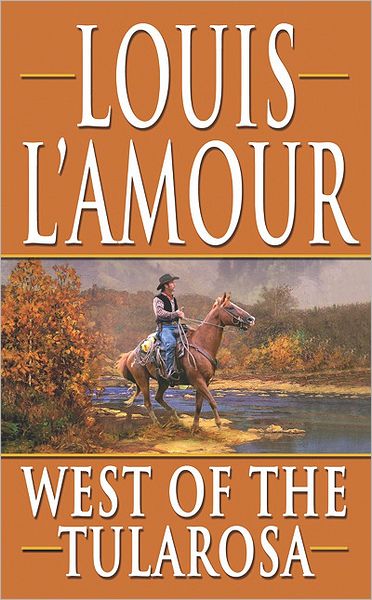
This incredibly prolific author is to westerns what Stephen King is to horror and Agatha Christie is to mysteries. Modern critics who insist all heroes be flawed despise writers like the old merchant marine (that's right--he spent more time asea than he ever did on horseback--as you'll learn in the interesting introduction/L'Amour biography). And yes, his books do tend to be formulaic. But hey--he developed his own formula. He didn't copy Zane Gray, Max Brand or anyone else.
In West of the Tularosa, a compilation of some shorter fiction from his early career (most of it written for western pulps), the legendary author is a bit more versatile than most of us have gotten used to. Oh, sure: The hero of each story is pretty much the same guy with a different name and a different gun (once in a while a different occupation--like an hombre who traps mountain lions for circuses). OK. And the leading ladies are all the same fetching western lass, as well. Granted. And big surprise: aforementioned hero always beats the bad guys and wins the heart of aforementioned fetching western lass. But don't assume L'Amour was just conforming to the times he grew up in. Watch a boxing movie from the time period in these tales were written (late '40s-early '50s), or some film noir, or read some of the crime fiction of the period. Pop culture had its share of squeaky-clean, handsome, G-rated good guys up to this point, to be certain; but to stick with that ran against the artistic zeitgeist.
L'Amour's protagonists weren't just handsome good guys--they were good good guys. Clean, honorable and honest. This reflected the sentimentality he and his readers felt about the frontier stage of American history. As Gene Autry sang in "Back in the Saddle Again":
...Out where a friend is a friend
Where you sleep out every night
And the only law is right
The "wild west" is frequently characterized as lawless. Well, they certainly didn't have all the police and jack-booted federal agents harassing the citizenry that we do now. Or lawyers, either. Yet society as a whole functioned much better then, despite the respective technology (women and children were safer, statistically, in the very worst frontier towns than they are today in our cities, for instance). Why? Most of the citizens didn't know much about the law, but they sure knew right from wrong.
Can't really say that today, can we?
We could sure use the kind of men L'Amour wrote about in our country now. It would be nice if everyone could brag that their "friends" were truly friends, too.
There were some good yarns in this anthology. Some felt cut a little short, probably due to their original pulp-bound purpose. A few could (should?) have been expanded to novel-length. It's easy to see why so many readers relate to this author's protagonists--they're young, strong, brave, good-looking and honest to a fault. Oh yeah, and almost always a phenomenal gunfighter, even if they punch cattle for a living. As Jeff Cooper might say, "They ride (hard), shoot straight, and speak the truth."
My favorite yarn in the batch was the last, the longest, and the one from which the title of this anthology was taken: West of the Tularosa. It's on the complex side for a L'Amour tale, some whodunnit mystery mixed in with the familiar range conflict.
R.I.P. Louis, we miss you. And your heroes.

No comments:
Post a Comment
Spammers go home (and get a life)!.
Note: Only a member of this blog may post a comment.